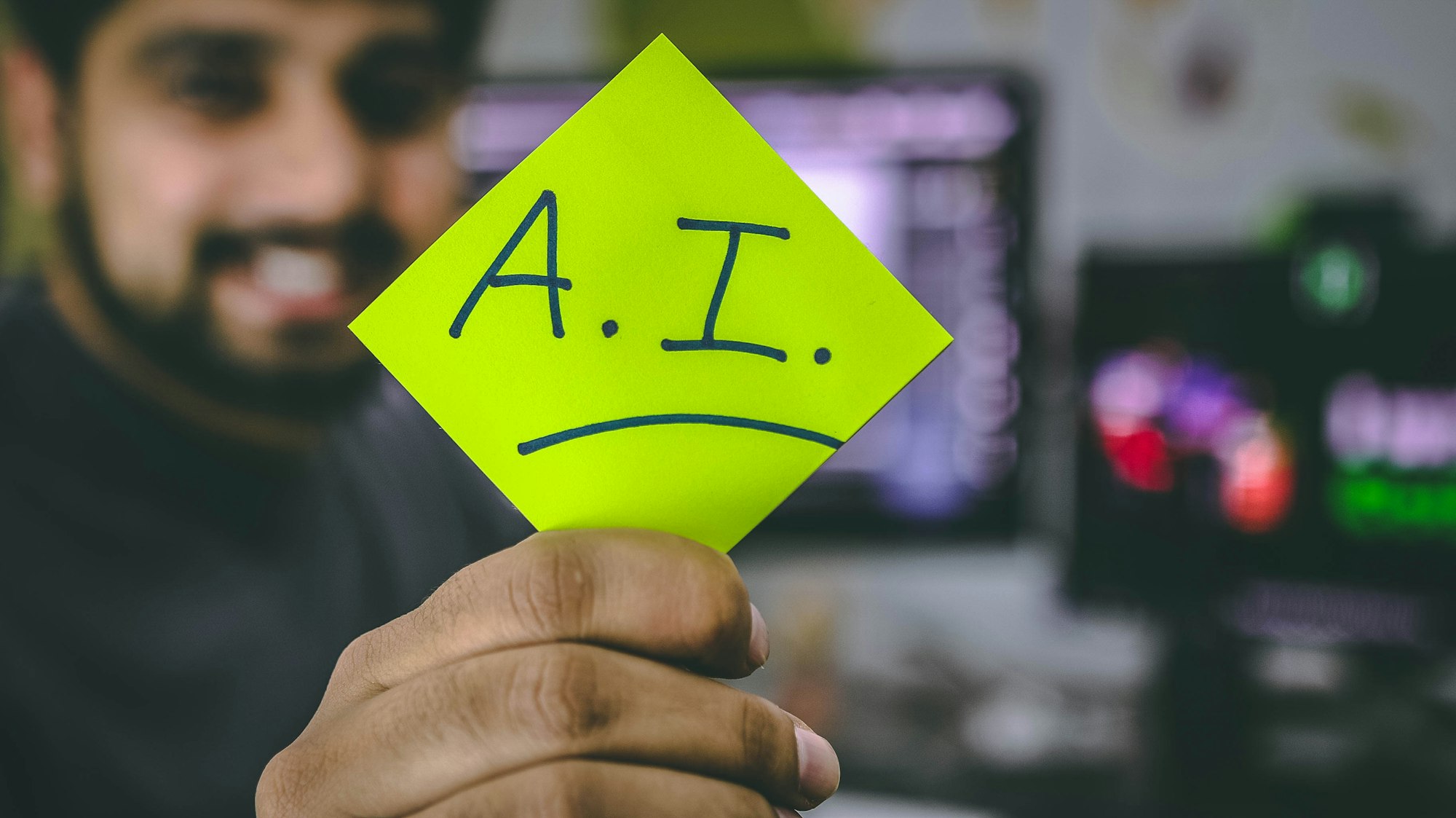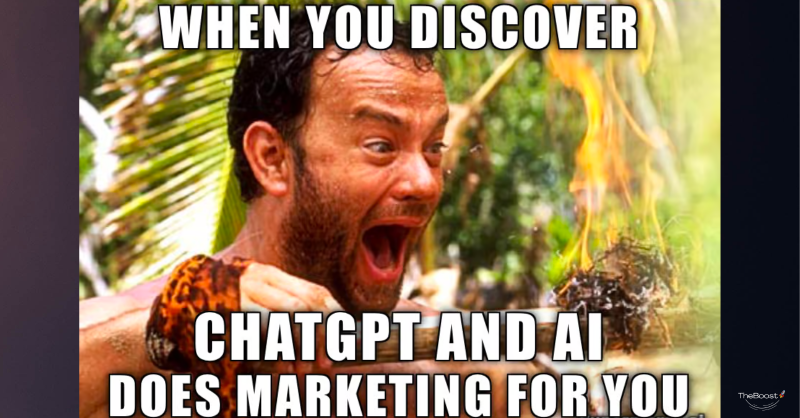The Role of Artificial Intelligence in Marketing Strategies
Want to learn how AI can help improve our marketing? From predictive analytics to personalized experiences, let's explore how AI reshapes strategies for success.

Unless you've been living under a rock for the last year, you must know that AI is all the rage these days. And if you run a business, you've already probably integrated AI into various business areas, including marketing.
According to recent PwC studies, 72% of business leaders believe AI is a "business advantage."

Entrepreneurs are discovering the power of AI tools to amplify their marketing efforts and drive substantial growth. From predictive analytics to chatbots, these tools streamline tasks, providing results at a quality and speed that was once unimaginable.
Join us as we explore the latest tools revolutionizing artificial intelligence in marketing and delve into the game-changing benefits of entrusting these tasks to virtual assistants. It's time to not just keep up with the competition but surge ahead, harnessing the full potential of AI in your business endeavors.
How to use AI in Marketing?

Artificial Intelligence (AI) has become a game-changer in marketing. Let's discuss how to use AI for marketing and how it can reshape and redefine marketing strategies.
Predictive Analytics: According to a survey, 53% of marketers utilize AI for data analysis purposes. AI algorithms analyze vast datasets to predict future trends and consumer behavior. Businesses can make data-driven decisions by understanding patterns and correlations and optimizing their marketing efforts for maximum impact.
Personalization at Scale: Gone are the days of generic marketing messages. Using AI in marketing enables hyper-personalization by tailoring content to individual preferences, increasing engagement and conversion rates.
Chatbots and Conversational AI: Did you know that the projected size of the global chatbot market is estimated to reach $1.25 billion by 2025? Providing instant customer support and engagement, AI-powered chatbots enhance user experience. Whether answering queries, guiding users through the sales funnel, or offering product recommendations, they operate 24/7, ensuring consistent and efficient communication.
Content Creation and Curation: AI tools can generate and curate content at a scale that was once unimaginable. From writing compelling copy to suggesting topics based on audience interests, AI augments the creative process, allowing marketers to focus on strategy and innovation. Nowadays, an AI photo editor can also have a profound impact on content creation and curation by streamlining the editing process and enhancing the overall quality of visual content.
Ad Targeting and Optimization: AI algorithms analyze user behavior and preferences, enabling targeted advertising. Using AI in advertising thus maximizes ad relevance and optimizes budget allocation, ensuring marketing resources are used efficiently" - says Jacek Zmudzinski, Team Lead at MakoLab.
Which AI tools help marketing?
The synergy between Artificial Intelligence (AI) and marketing tools is set to redefine the entire game. Here’s how AI can help marketers and small business owners.
Hyper-Personalization: AI will turn personalization into an art form. Tools like Adobe Target and Dynamic Yield will analyze user behavior with surgical precision. The result? Marketing messages so tailored that it feels like your brand is hand-delivering precisely what customers want.

Voice Search Revolution with SEO: With voice searches rising, AI-driven tools like SEMrush and Ahrefs will become indispensable. They'll help marketers optimize content for voice queries, ensuring your brand is heard loud and clear in the audience's ears.

AI-Generated Creatives: Tools like Canva will evolve with AI integrations, offering marketers design assistance and creative suggestions powered by algorithms. ChatGPT’s DALL-E integration is another example of how brands can get their hands on creatives on a budget.

Augmented Reality (AR) Marketing: AR marketing, backed by AI, will reshape the consumer experience. Tools like Shopify AR will allow businesses to showcase products in AR, letting customers virtually try before they buy. This type of shopping experience will bring a whole new dimension of engagement.

Predictive Customer Service: AI-driven tools like Zendesk and Salesforce will change customer service. They'll predict customer issues before they arise, leveraging data to resolve concerns proactively.

Why Businesses Should Embrace AI
Some may hesitate to use AI, perhaps fearing the unknown or clinging to familiarity. But let's pause for a moment and consider the possibilities that AI brings to the table.
AI's predictive analytics capabilities enable businesses to anticipate market trends and consumer behavior with unprecedented accuracy. Microsoft's CEO Satya Nadella aptly says, "AI is the runtime that's going to shape all of what we do going forward." This runtime isn't just about making predictions; it's about making informed decisions that drive success.
Moreover, AI facilitates personalized experiences at scale. From chatbots providing instant customer support to algorithms tailoring marketing messages, AI enhances engagement and fosters stronger customer connections. As Sundar Pichai, CEO of Google, asserts, "AI is probably the most important thing humanity has ever worked on."
But perhaps the most compelling aspect of artificial intelligence for marketing lies in its ability to augment human potential. By automating repetitive tasks and providing actionable insights, AI liberates business owners to focus on higher-value work.
How outsourcing to a virtual assistant can help

Outsourcing artificial intelligence marketing strategy to a virtual assistant can be a strategic move for businesses looking to leverage technology efficiently and cost-effectively. Here are several ways in which this approach can benefit businesses:
Cost-Effectiveness: Hiring a virtual assistant for AI marketing tasks can be more cost-effective than hiring a full-time employee or investing in expensive marketing automation software. Virtual assistants often operate on a flexible payment model, allowing businesses to pay only for the services they need, whether running ad campaigns, analyzing data, or managing social media accounts.
Expertise and Efficiency: Virtual assistants specializing in AI marketing bring expertise and efficiency to the table. They are often trained in the latest AI tools, algorithms, and marketing strategies, enabling them to execute tasks precisely and effectively. Businesses can tap into this expertise without investing time and resources in training their employees.
Scalability: As businesses grow, their marketing needs evolve. Virtual assistants offer scalability, allowing companies to scale their marketing efforts up or down based on demand. Whether it's managing a small-scale campaign or orchestrating a large-scale marketing initiative, virtual assistants can adapt to meet the needs of the business.
Data Analysis and Insights: They can track key performance metrics based on data collected with AI, conduct A/B testing, and identify trends and patterns in consumer behavior. By leveraging these insights, businesses can make data-driven decisions to optimize their marketing strategies and maximize ROI.
Personalization and Targeting: AI algorithms can help businesses personalize their marketing campaigns based on customer preferences, browsing history, and demographic information. Virtual assistants can segment audiences, create targeted messaging, and deliver personalized recommendations, increasing engagement and conversion rates.
Adaptability to Emerging Trends: AI marketing constantly evolves, with new tools, techniques, and trends emerging regularly. Virtual assistants stay ahead of these developments, ensuring businesses remain competitive in the ever-changing digital landscape.
AI Marketing Tasks You Can Outsource to a Virtual Assistant
Outsourcing AI marketing tasks to a virtual assistant can significantly streamline your operations and enhance your marketing effectiveness. Here are some key tasks that you can entrust to a virtual assistant:
Data Analysis and Insights:
- Your virtual assistant can analyze marketing data collected from various sources, including website analytics, social media platforms, and customer relationship management (CRM) systems.
- They can identify trends, patterns, and correlations within the data to extract actionable insights that inform your marketing strategies.
- By leveraging AI-powered analytics tools, your virtual assistant can provide valuable recommendations for optimizing campaigns, improving targeting, and enhancing overall performance.
Content Creation and Curation:
- Virtual assistants can assist in content creation by researching topics, drafting blog posts, creating social media updates, and developing email newsletters.
- AI-driven content generation tools can be utilized to generate compelling copy, headlines, and descriptions tailored to your target audience.
- Additionally, your virtual assistant can curate relevant content from reputable sources to share with your audience, establishing your brand as a trusted source of information in your industry.
Social Media Management:
- Your virtual assistant can manage your social media accounts by scheduling posts, responding to comments and messages, and engaging with followers.
- AI-powered social media management platforms can help analyze audience behavior, optimize posting schedules, and identify opportunities for increased engagement.
- By monitoring social media metrics and performance indicators, your virtual assistant can refine your social media strategy to drive better results and foster meaningful connections with your audience.
Email Marketing Campaigns:
- Virtual assistants can design, execute, and monitor email marketing campaigns to nurture leads, promote products or services, and drive conversions.
- AI-driven email marketing tools can personalize messages based on recipient preferences, behavior, and past interactions with your brand.
- Your virtual assistant can segment your email list, conduct A/B testing, and analyze campaign performance to refine your email marketing strategy and achieve higher open and click-through rates.
Search Engine Optimization (SEO) Optimization:
- Your virtual assistant can conduct keyword research, optimize website content, and monitor search engine rankings to improve your organic visibility and drive targeted traffic.
- AI-powered SEO tools can analyze competitor strategies, identify opportunities for optimization, and track changes in search engine algorithms.
- By staying abreast of SEO best practices and implementing data-driven strategies, your virtual assistant can help boost your website's search engine rankings and enhance its overall online presence.
Campaign Performance Monitoring and Reporting:
- Your virtual assistant can monitor the performance of your marketing campaigns in real time, tracking key performance indicators (KPIs) such as click-through rates, conversion rates, and return on investment (ROI).
- AI-driven analytics platforms can generate customized reports and dashboards that provide insights into campaign effectiveness, audience engagement, and revenue generation.
- By regularly analyzing campaign metrics and identifying areas for improvement, your virtual assistant can help optimize your marketing efforts and maximize your ROI.
Why Wishup Excels as the Premier Virtual Assistance Service Provider

At Wishupreal time, we pride ourselves on delivering unmatched virtual assistance tailored to your needs. Explore the pinnacle of our service through these exceptional benefits:
Swift 24-Hour Onboarding: Our seamless onboarding process ensures you receive prompt assistance within 24 hours of subscription.
1% Talent Pool: Gain access to the top 1% of applicants when hiring virtual assistants from Wishup, ensuring professionalism and expertise.
Instant Replacement Guarantee: Enjoy uninterrupted support with our commitment to instant replacement, guaranteeing continuity in your operations.
Global Reach: Choose from a diverse pool of Indian and US based virtual assistants, offering flexibility and cultural understanding to meet your unique requirements.

Complete Security: Rest assured that our stringent security protocols safeguard the confidentiality of your sensitive information.
Comprehensive Skill Sets: Our virtual assistants come pre-trained in over 200 skill sets and 70+ no-code tools, empowering them to handle diverse tasks efficiently.
Risk-Free 7-Day Trial: Experience the exceptional service of Wishup risk-free for 7 days, allowing you to witness the difference with no commitment required.

Conclusion
From this blog, one thing is clear. The emergence of Artificial Intelligence isn't just a trend; it's a fundamental shift in how businesses engage with their audience. It's a powerful tool that businesses can use to turn data into effective strategies.
At Wishup, we understand the transformative power of this union. Our commitment lies in taking the best of AI intelligence and expert virtual assistance to help businesses reach their full potential.
Curious about the possibilities? Reach out today to schedule a free consultation to hire a VA, or drop us a line at [email protected].
AI and Marketing: Frequently Asked Questions
How is AI used in marketing?
AI in marketing analyzes data to predict trends, personalize content, and optimize ad targeting. It streamlines tasks like data analysis and customer segmentation, enabling data-driven decisions for better campaign performance.
What is the best example of AI in marketing?
The best AI example in marketing is personalized recommendations on platforms like Amazon and Netflix. They use AI algorithms to analyze user behavior and preferences, suggesting products or content tailored to individual interests.
Why is AI the future of marketing?
AI is the future of marketing because it enhances personalization, automates repetitive tasks, and improves decision-making with data insights. It enables marketers to engage customers more effectively, optimize campaigns efficiently, and stay competitive in the rapidly evolving digital landscape.
How is AI used in performance marketing?
In performance marketing, AI optimizes ad placements, adjusts bids in real-time, and targets specific audience segments based on behavior patterns. It enhances campaign performance by maximizing ROI and improving overall efficiency.
